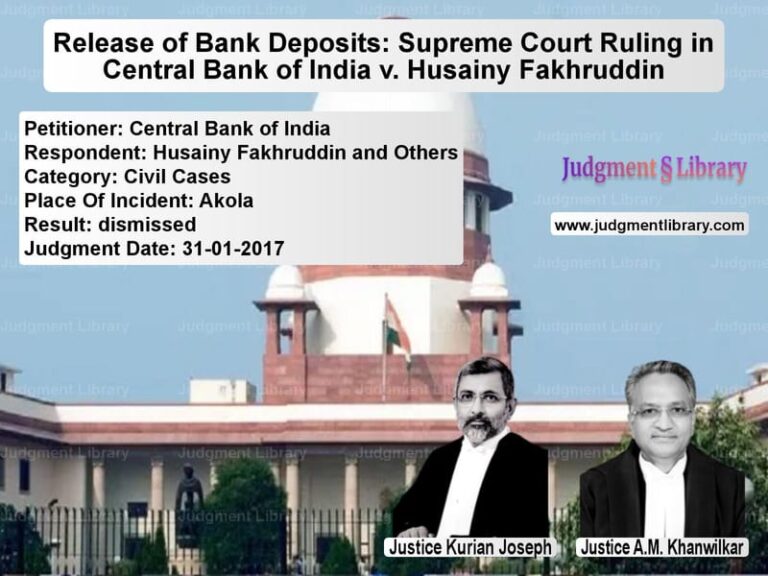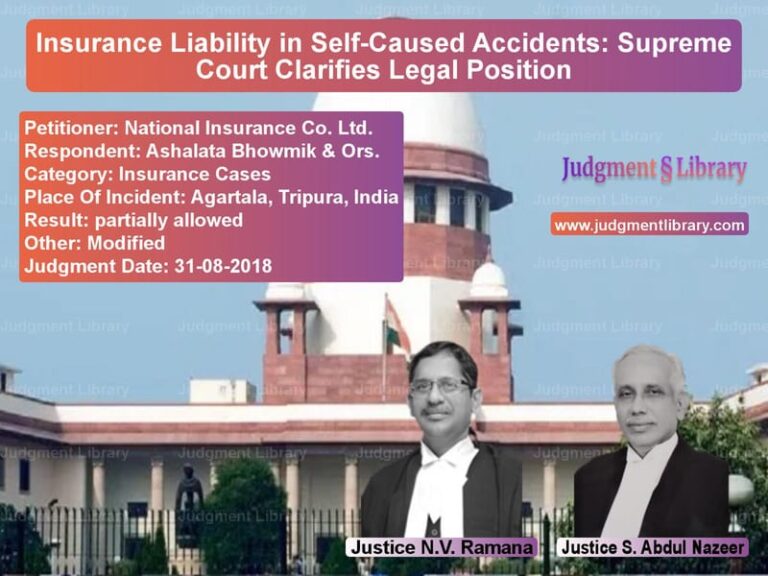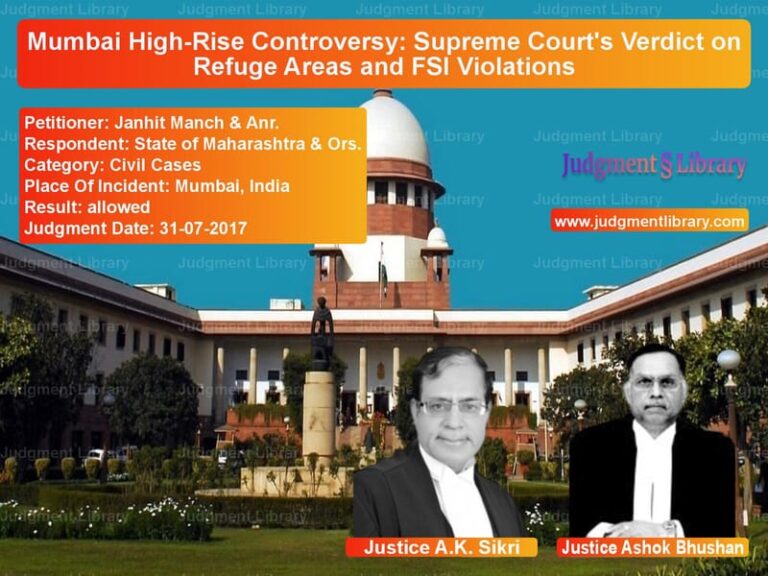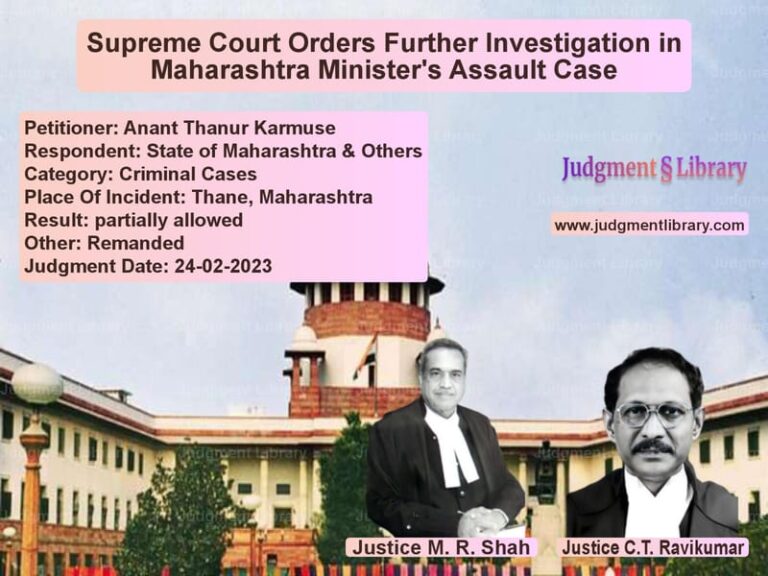Tamil Nadu Special Reservation Act Struck Down: Supreme Court’s Landmark Ruling
The Supreme Court of India, in a significant judgment, struck down the Tamil Nadu Special Reservation of Seats in Educational Institutions and of Appointments or Posts in Services under the State Act, 2021. This case challenged the constitutional validity of the internal reservation granted to the Vanniakula Kshatriya community within the Most Backward Classes (MBC) and Denotified Communities (DNC). The Court examined whether the Act was in line with the principles of equality enshrined in the Constitution and whether it was supported by adequate data to justify such a classification.
Background of the Case
The Tamil Nadu government enacted the Special Reservation Act, 2021, which provided a 10.5% internal reservation for the Vanniakula Kshatriya community within the 20% reservation quota already allocated to the MBCs and DNCs. This classification was challenged by various other MBC groups, who argued that such a move was unconstitutional, arbitrary, and not supported by adequate data.
Earlier, the Madras High Court had declared the Act unconstitutional, stating that it was based on outdated and insufficient data. The Tamil Nadu government appealed to the Supreme Court, contending that the reservation was essential for ensuring fair representation of the Vanniakula Kshatriya community.
Key Legal Issues Considered
- Whether the Tamil Nadu legislature had the legislative competence to enact the Act.
- Whether the classification of the Vanniakula Kshatriya community for internal reservation was justified under Articles 14, 15, and 16 of the Constitution.
- Whether the Act violated the constitutional principle against caste-based reservations without quantifiable data.
- Whether the absence of recent data justified striking down the Act.
Arguments by the Petitioners
The petitioners, including various representatives from other MBC communities, argued:
- The reservation was granted solely on caste basis without any consideration of social and educational backwardness.
- There was no contemporary quantifiable data justifying this internal reservation.
- The Act violated the Supreme Court’s ruling in Indra Sawhney v. Union of India, which mandated that reservations should not exceed 50% unless there were extraordinary circumstances.
- Internal reservation within the MBC category disrupted the balance and denied equitable opportunities to other MBCs and DNCs.
Arguments by the Respondents (State of Tamil Nadu)
The Tamil Nadu government defended the Act by stating:
- The Vanniakula Kshatriya community had been historically marginalized and required special protection to ensure fair representation.
- Past commission reports, including the Ambashankar Commission, recommended internal reservation to correct historical disadvantages.
- The classification was within the legislative competence of the Tamil Nadu Assembly.
- The Act aimed to promote social justice and ensure that the benefits of reservation reached the most disadvantaged sections.
Supreme Court’s Observations
The Supreme Court analyzed multiple legal precedents and examined the Tamil Nadu government’s justification for the internal reservation. The Court emphasized:
- Lack of contemporary data: The Act relied on outdated studies that did not reflect the current socio-economic status of the Vanniakula Kshatriya community.
- Violation of the equality principle: Reservation based solely on caste, without quantifiable data on backwardness, violates the fundamental principles of equality.
- Constitutional mandate: Under Article 16(4), reservation should be based on adequate empirical evidence demonstrating inadequate representation.
- Misuse of legislative power: The Tamil Nadu legislature failed to conduct a fresh survey before implementing the internal reservation.
The Court stated:
“The enactment of the Special Reservation Act, 2021, is a clear violation of the constitutional mandate that requires reservations to be supported by quantifiable data. In the absence of such data, the classification made by the State cannot be sustained.”
Read also: https://judgmentlibrary.com/contempt-proceedings-against-vijay-kurle-ors-supreme-courts-decision/
Final Judgment
The Supreme Court upheld the decision of the Madras High Court and declared the Tamil Nadu Special Reservation Act, 2021, unconstitutional. The key rulings included:
- The Act was struck down for violating the constitutional principle of equality.
- The internal reservation of 10.5% for the Vanniakula Kshatriya community was declared void.
- The Tamil Nadu government was directed to undertake a fresh socio-economic survey before proposing any new reservation policy.
- The Court reaffirmed that reservations must be based on verifiable data rather than historical assumptions.
Key Takeaways from the Judgment
- Reservation policies must be backed by data: The Court reinforced the need for contemporary evidence to justify internal reservations.
- Equality and fairness in reservations: The ruling ensures that reservation benefits are not arbitrarily distributed to certain communities without justification.
- Limits of state legislature power: States must follow constitutional guidelines and Supreme Court precedents when enacting reservation laws.
- Potential impact on future reservation policies: The judgment sets a precedent for evaluating internal reservations in other states.
Conclusion
This ruling serves as a critical reminder that reservations should be designed with fairness and data-driven justifications. The decision not only impacts Tamil Nadu’s reservation policy but also sets the tone for future legislative actions regarding internal reservations across India. The Supreme Court’s emphasis on empirical evidence and constitutional compliance ensures that affirmative action policies remain aligned with the principles of equality and justice.
Petitioner Name: Pattali Makkal Katchi.Respondent Name: A. Mayilerumperumal & Ors..Judgment By: Justice L. Nageswara Rao, Justice B. R. Gavai.Place Of Incident: Tamil Nadu.Judgment Date: 31-03-2022.
Don’t miss out on the full details! Download the complete judgment in PDF format below and gain valuable insights instantly!
Download Judgment: pattali-makkal-katch-vs-a.-mayilerumperumal-supreme-court-of-india-judgment-dated-31-03-2022.pdf
Directly Download Judgment: Directly download this Judgment
See all petitions in Fundamental Rights
See all petitions in Constitution Interpretation
See all petitions in Legislative Powers
See all petitions in Public Interest Litigation
See all petitions in Judgment by L. Nageswara Rao
See all petitions in Judgment by B R Gavai
See all petitions in dismissed
See all petitions in supreme court of India judgments March 2022
See all petitions in 2022 judgments
See all posts in Constitutional Cases Category
See all allowed petitions in Constitutional Cases Category
See all Dismissed petitions in Constitutional Cases Category
See all partially allowed petitions in Constitutional Cases Category







